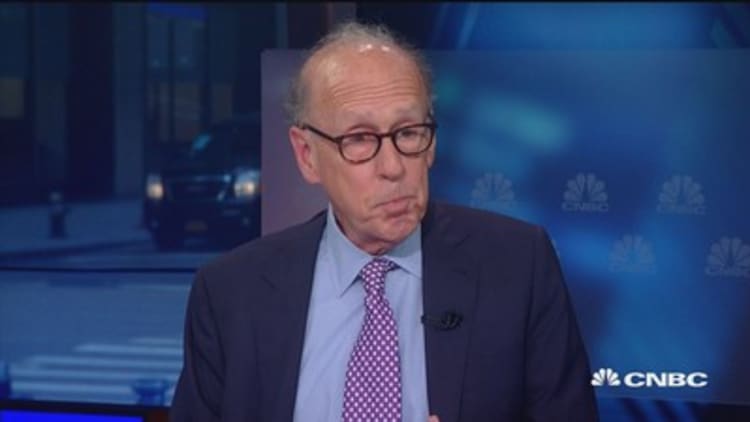The 30 percent plunge in the Shanghai composite has China's government stepping in to orchestrate a $19 billion stock purchase program to prevent a full-blown crash.
More than half of China's listed companies were halted to mitigate the selloff, as more than just local traders worry that the momentum that boosted Chinese stocks to seven-year highs might just be starting to reverse to something much worse.
And while retail investors who account for more than 80 percent of the trading on China's equity market scramble to stop the losses, the manager behind the largest fund most exposed on a dollar basis to China says it's not time for U.S. investors to panic.
"The biggest question you have to ask is whether this is a panic over a short-term liquidity freeze or a larger sign the country faces severe financial risk," said Fidelity's China region fund manager Robert Bao. "Our analysis is that it's the former and simply temporary." (Tweet This)
Read More Stock bubble in China is bursting: Stephen Roach
In fact, despite suffering what Bao calls an "unwarranted selloff" over the last month, all of the funds with extreme Chinese exposure are still positive year to date.
And while Bao conceded that margin financing remains high in China from a historical point of view, he said in terms of total financial impact the risk is minimal. "Going back to 2008, you couldn't have said that about the U.S. market," he said.
Nonetheless both the U.S. and China have similarly intervened in their respective markets. "Sometimes the action is not as coordinated as you'd hope," Bao said, "but they have shown the will to do whatever it takes."

That much is even more welcome news for China's retail investors who are heavily invested in speculative local A-shares traded on China's exchanges. For U.S. investors, however, Morningstar senior fund analyst Bill Rocco points out that most funds have minuscule direct exposure to those companies.
"The average Chinese stock didn't lose 30 percent, it was mostly the local stocks," he said. "You shouldn't sell funds based on local stocks selling off, the larger point is you should know what you own."
Read More Asian stocks sink as China, Greece fears rattle investors
That is especially true for emerging market funds like the one Bao's Fidelity colleague Sammy Simnegar manages, which might not immediately reveal exposure to China. But Simnegar notes that even that A-share exposure is limited to about 7 percent on average.
"A 30 percent drop on 7 percent is a 2 percent impact on average, so to me that's not material," Simnegar said.
But Bao and Simnegar reiterated that their funds focus less on the speculative companies that momentum-driven retail investors chase up or down, and more on those with less volatile future cash flows.
"The interesting thing is the good companies are not playing in bubble territory," Simnegar said. "These companies have gone from relatively cheap to reasonably priced."
Perhaps the panic from American investors is unwarranted as even Bao's heavily exposed China region fund's 13 percent loss over the last month pales in comparison to the declines posted by exchange-traded funds like Deutche's, which tracks China's A-shares.
Urging investors to take a step back and appreciate that fact has been a tiring feat for Bao on his snap trip stateside.
"I've been telling people to calm down," he said. "You can't let short-term volatility cloud a long-term approach."


